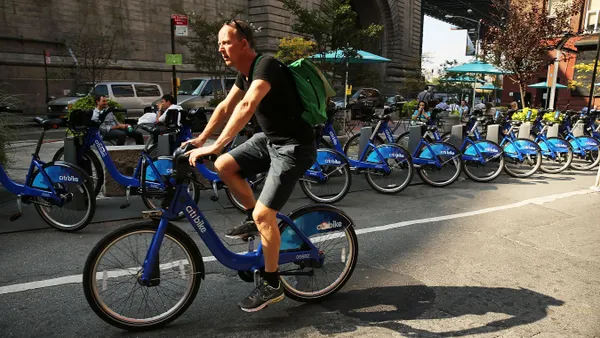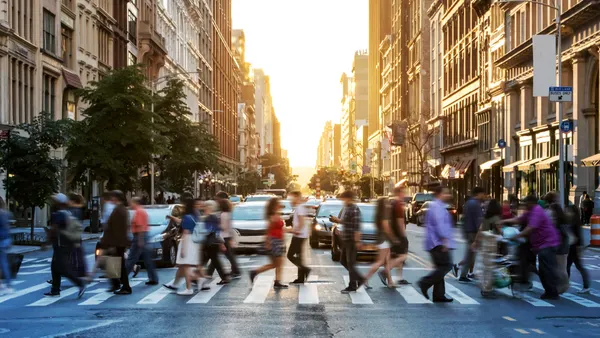UPDATE, Jan. 15, 2019: Uber will roll out its 15-pence-per-mile "clean air fee" in London tomorrow (Jan. 16) following an October announcement of the company's Clean Air Plan. The surcharge is aimed to help drivers eventually upgrade from gas/diesel cars to battery-electric vehicles.
While the plan is a step in the right direction to tackle air pollution in London, it will be some time before the fee significantly accumulates. The Verge reports that an average Uber ride in London is around three miles, therefore a driver will typically accumulate about 45 pence for each ride. It will take around three years of the driver working 40 hours per week to accumulate about £4,500 (USD $5,777).
Dive Brief:
- Uber announced a plan Tuesday for every car driven through its app in London to be electric by 2025.
- The company released its "Clean Air Plan," which it said will help the city tackle air pollution. The plan includes a "clean air fee" for riders of 15 pence (27-28 cents USD) per mile to help drivers upgrade to an electric vehicle (EV). Drivers can then earn assistance to help them buy an EV based on the number of miles they have driven on the app.
- "The Mayor of London has set out a bold vision to tackle air pollution in the capital and we’re determined to do everything we can to back it," Uber CEO Dara Khosrowshahi said in a statement. "Our £200 million Clean Air Plan is a long-term investment in the future of London aimed at going all electric in the capital in 2025."
Dive Insight:
Uber expects the "clean air fee" to raise more than 200 million GBP ($260 million USD) to support drivers buying EVs and comes with London starting to up the ante in its efforts to curb climate change and air pollution. Last week, the City of London Corporation unveiled plans to develop "pedestrian priority" zones in half of the city's financial district, known as the Square Mile, that would ban access to cars, vans and other vehicles, while the city’s congestion charge is being seen as a model for other gridlocked cities like New York City to try and curb downtown traffic.
This new plan comes after Uber and London had to rebuild their relationship following a tumultuous period. In June, the company won its legal appeal and was able to operate again on a 15-month probationary license, but Uber drivers went on strike early this month to protest unfair pay conditions and employee classifications, part of a wider discussion around the rights of workers in the so-called "gig economy." The incentive-based assistance, which Uber said could mean around 3,000 GBP in support over two years for a driver that uses the app for 40 hours a week on average, could make some workers’ rights advocates pause.
This is not the first time Uber has made an environmental commitment; earlier this year Khosrowshahi committed the company to investing $10 million over three years to "campaign for ideas" that advance shared mobility, including efforts on congestion pricing. And with Lyft making similar moves towards carbon neutrality and an eco-friendly future, both companies are looking to partner with cities to reach their environmental goals.
"The aim for London Uber journeys to use only fully electric cars by 2025 is one of the most ambitious aims of any major company in the future mobility sector," Chris Large, senior partner at the charity Global Action Plan, said in a statement.










